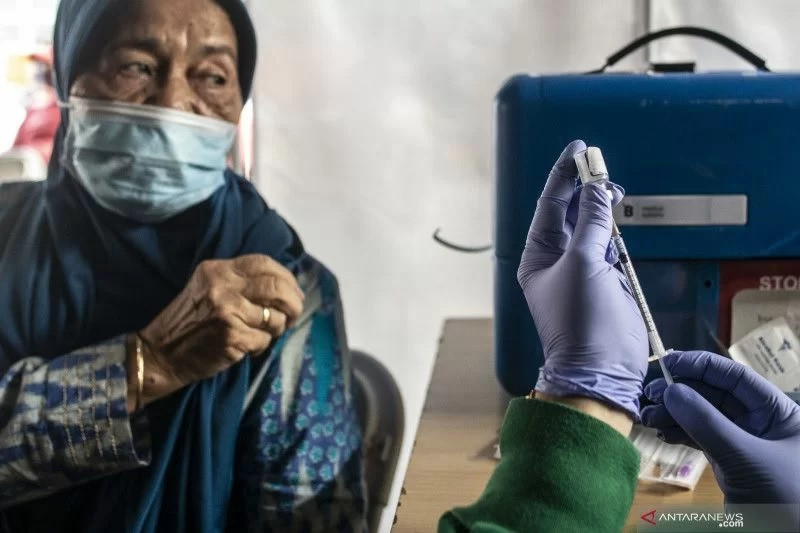Popular Reads
Top Results
Can't find what you're looking for?
View all search resultsPopular Reads
Top Results
Can't find what you're looking for?
View all search resultsJakarta virus curbs remain unchanged amid case spike
Minister Luhut rules out return of COVID-19 emergency restrictions.
Change text size
Gift Premium Articles
to Anyone
J
akarta will remain under prevailing COVID-19 curbs at least for the time being, the government has announced, despite a recent case spike in the city that authorities have called “the first battleground” in the fight against the highly contagious Omicron variant.
The capital, excluding its extensive satellite cities, is home to some 12 million people and has been the worst-hit region in the current surge of coronavirus infections, accounting for more than half of the nation’s recent cases. It is also the main gateway for international arrivals to the country and was the epicenter of some of the pandemic’s previous outbreaks.
Coordinating Maritime Affairs and Investment Minister Luhut Pandjaitan said the government would treat Jakarta and the surrounding cities of Depok, Bogor and Bekasi in West Java and Tangerang in Banten as one unit for the purposes of virus control and that the current situation did not warrant a change in the capital city’s public mobility restrictions (PPKM).
“The government consistently treats Jakarta as a unified agglomeration of Greater Jakarta, which is currently still under [PPKM] level 2,” Luhut said at a press conference on Monday. He added, however, that as Jakarta was a pandemic “theater of war” with dynamic conditions, the government’s assessment could change in the future.
Under PPKM level 2, malls are allowed to remain open until 9:00 p.m. at 50 percent capacity, while public parks are allowed to welcome visitors at 25 percent of capacity, among other provisions.
Luhut added that the government “had never thought of” reinstating emergency public activity restrictions (PPKM Darurat), the country’s most stringent curbs, which were enacted in anticipation of the Delta variant wave last year.
Case increase
On Tuesday, the country recorded 4,878 new COVID-19 cases, making for more than 24,000 active cases. During the peak of the second wave in June and July of last year, the country recorded up to 56,000 new cases a day and more than 500,000 active cases.
In Jakarta, the number of active COVID-19 cases has nearly tripled in the past week, from 4,300 cases on Jan. 18 to 12,100 on Tuesday – the highest since August of last year. The number of daily new cases also increased from 670 to 2,190 over the same period.
Hospitalizations in the capital are also on the rise. Jakarta’s COVID-19 bed occupancy rate increased from 8 percent on Jan. 3 to 32 percent on Jan. 24.
On Tuesday, the city reported nine deaths from COVID-19, the highest since September.
Luhut, however, said the fatality rate in Jakarta was lower than the government had expected based on models from South Africa’s Omicron outbreak. He attributed this to Jakarta’s high vaccination rate and public discipline in registering with the government’s tracing app, PeduliLindungi, when entering public spaces.
Dicky Budiman, an epidemiologist at Griffith University in Australia, said that given the current situation, the government should review its restriction levels.
“The government needs to review its PPKM indicators so that it can be more flexible in adjusting to the conditions on the ground,” said Dicky. “We need to do this before it’s too late.”
While the government could stick with PPKM level 2 and avoid hard lockdown measures, he said, some adjustments, particularly regarding in-class learning and home working policies, should be tightened in accordance with the current situation.
Omicron-fueled wave
Indonesia has reported around 1,160 cases of the Omicron variant since it was first detected in the country in December 2021. More than half of those cases have been imported. However, experts say the true scale of the outbreak could be obscured by Indonesia's inadequate testing, tracing and genomic sequencing efforts.
As the Omicron variant is more transmissible than other coronavirus strains, authorities have predicted that the country will see an even larger surge of cases than last year, with daily confirmed cases perhaps reaching more than 60,000 a day.
The government has projected that the country will reach the peak of the case surge between mid-February and early March.
Health Minister Budi Gunadi Sadikin urged the public to remain calm, considering that infection with the Omicron variant was known to result in generally milder symptoms than the variants behind previous surges.
“We don’t need to panic, because hospitalizations and fatalities [from Omicron] are far lower than Delta,” said Budi on Monday. “We need to make sure that we follow the health protocols.”
As Greater Jakarta was expected to be a hotspot for Omicron infection, Budi said, the government would focus on accelerating the booster shot rollout in the area, particularly for the elderly.










